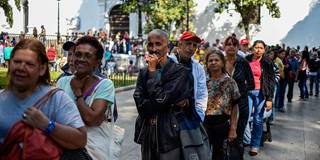Anti-populists in the US, the UK, and elsewhere must grasp the reality that bad policies pay off, both economically and politically, long before they become toxic. If critics do not understand that and act accordingly, populists will have as long (and destructive) a run in the rich countries as they once had in Latin America.
SANTIAGO – Now that populists are coming to power in the West, a conflict over the intellectual ownership of their approach is brewing. Writers like John Judis claim that nineteenth-century Americans invented political populism, with its anti-elitist stance and inflammatory rhetoric. Argentines, who gave the world über-populist Juan Domingo Perón, or Brazilians, who brought us Getúlio Vargas, might beg to differ.
Yet there can be no disagreement that Latin Americans have been the longest and best practitioners of economic populism. In the twentieth century, Perón and Vargas, plus Alan García in Perú (at least during his first term), Daniel Ortega in Nicaragua and Salvador Allende in Chile, and many others, engaged in trade protectionism, ran large budget deficits, overheated their economies, allowed inflation to rise, and eventually suffered currency crises. In recent years, Hugo Chávez and Nicolás Maduro of Venezuela took these policies to new lows.
What should the rich world, now undergoing its own bout of economic populism, learn from Latin America’s experience?

SANTIAGO – Now that populists are coming to power in the West, a conflict over the intellectual ownership of their approach is brewing. Writers like John Judis claim that nineteenth-century Americans invented political populism, with its anti-elitist stance and inflammatory rhetoric. Argentines, who gave the world über-populist Juan Domingo Perón, or Brazilians, who brought us Getúlio Vargas, might beg to differ.
Yet there can be no disagreement that Latin Americans have been the longest and best practitioners of economic populism. In the twentieth century, Perón and Vargas, plus Alan García in Perú (at least during his first term), Daniel Ortega in Nicaragua and Salvador Allende in Chile, and many others, engaged in trade protectionism, ran large budget deficits, overheated their economies, allowed inflation to rise, and eventually suffered currency crises. In recent years, Hugo Chávez and Nicolás Maduro of Venezuela took these policies to new lows.
What should the rich world, now undergoing its own bout of economic populism, learn from Latin America’s experience?